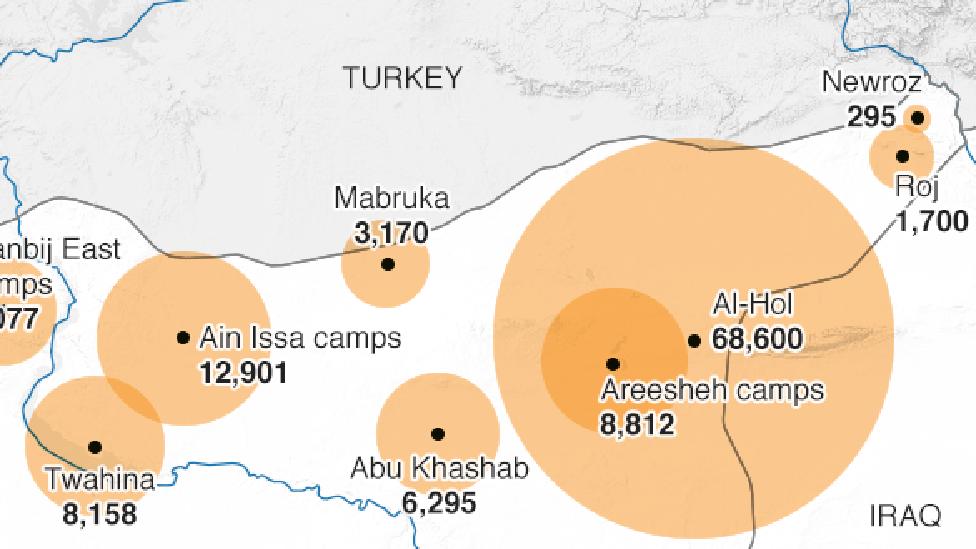Turkey-Syria offensive: Not our border, says Donald Trump
- Published
President Donald Trump exchange with reporter over troops withdrawal
President Donald Trump has said the US should not be intervening in Turkey's military operation in Syria because it is "not our border", and called the former US allies the Kurds "no angels".
The US is facing intense criticism for withdrawing its forces from Syria, which some say gave Turkey the green light to launch a cross-border offensive against Kurdish-led forces.
Mr Trump told reporters at the White House the US is "not a policing agent".
"It is time for us to go home."
The US House of Representatives voted overwhelmingly to condemn the president's withdrawal of US forces from northern Syria, with both Democrats and Mr Trump's fellow Republicans approving the measure.
Speaker of the House Nancy Pelosi later said Mr Trump had had a "meltdown" during a meeting with congressional leaders about Syria.
Democratic politicians eventually left the meeting after the president allegedly called her a "third-rate politician," according to Democratic Senator Chuck Schumer.
For his part, Mr Trump aimed the same accusation at Ms Pelosi.
Allow X content?
This article contains content provided by X. We ask for your permission before anything is loaded, as they may be using cookies and other technologies. You may want to read X’s cookie policy, external and privacy policy, external before accepting. To view this content choose ‘accept and continue’.

Republican leaders said Ms Pelosi's behaviour was "unbecoming", and criticised her for "storming out".
Turkish troops and allied Syrian rebels launched the offensive in northern Syria last week to push back from the border members of a Syrian Kurdish militia, called the People's Protection Units (YPG), and to create a "safe zone" where up to two million Syrian refugees can be resettled.
The Turkish operation came after Mr Trump ordered the withdrawal of US forces from the area.
Kurdish-led forces have been a critical ally of the US in the fight against the Islamic State (IS) group in Syria and there are fears the destabilisation could lead to a jihadist resurgence.
What did the president say?
Earlier reports on Wednesday suggested the president said Turkey's operation in Syria was "not our problem". In fact, Mr Trump said: "They have a problem at a border. It's not our border. We shouldn't be losing lives over it."
Mr Trump said he saw the situation on the Turkey-Syria border as "strategically brilliant" for the US.
Trump said earlier in October Kurds "didn't help us in Second World War"
"Our soldiers are out of there. Our soldiers are totally safe. They've got to work it out. Maybe they can do it without fighting," he said.
"We're watching and we're negotiating and we're trying to get Turkey to do the right thing, because we'd like to stop wars regardless."
The president also said that the Kurds were "not angels".
"They fought with us. We made a lot of money for them to fight with us, and that's OK," he said. "They did well when they fought with us. They didn't do so well when they didn't fight with us."
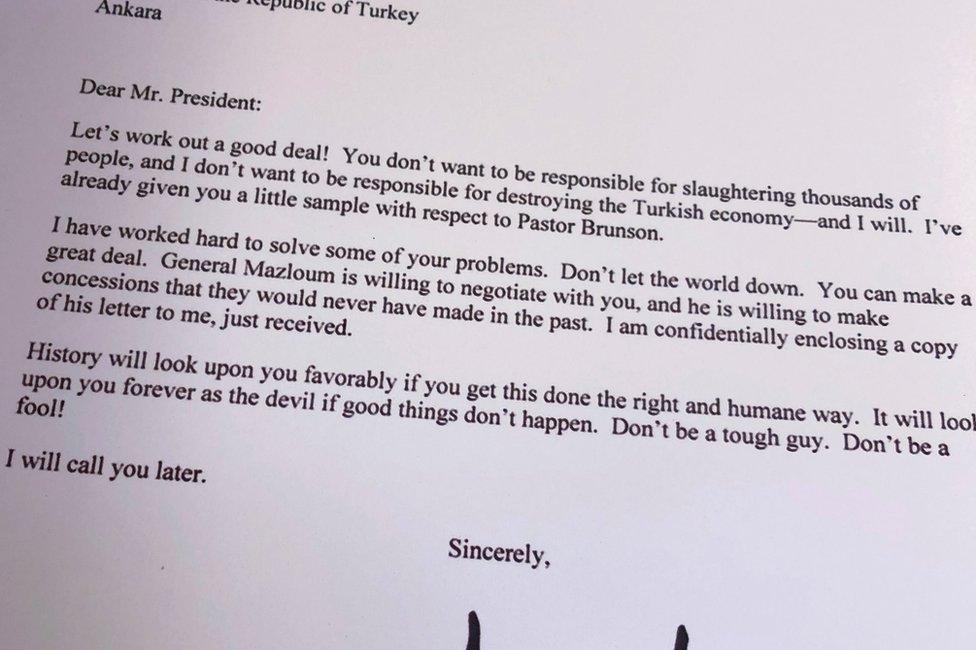
In a letter dated 9 October, Mr Trump urged his Turkish counterpart not to launch the offensive
Mr Trump added that the Kurdistan Workers' Party (PKK) - a rebel group that fights for Kurdish autonomy in Turkey - "is probably worse at terror and more of a terrorist threat in many ways than" IS.
He also insisted that he did not give Turkish President Recep Tayyip Erdogan a "green light" for the operation, insisting that he wrote a "very powerful letter" to Mr Erdogan after speaking to him on the phone about the incursion.
On Wednesday, a letter emerged dated 9 October, external - the day Turkey launched its offensive - in which Mr Trump told Mr Erdogan: "Don't be a tough guy. Don't be a fool!"
"You don't want to be responsible for slaughtering thousands of people, and I don't want to be responsible for destroying the Turkish economy - and I will," the letter said.
What's the context?
Ankara sees the YPG militia as an extension of the PKK.
The US has designated the PKK as a foreign terrorist organisation and Specially Designated Global Terrorist Entity. The US has previously acknowledged links between the PKK and YPG, but it has rejected Turkey's assertion that the YPG is an extension of the PKK.
The YPG dominates an alliance of Kurdish and Arab militias called the Syrian Democratic Forces (SDF), which drove IS militants out of a quarter of Syria over the past four years with the help of air strikes by a US-led multinational coalition.
On Sunday, after Turkish-led forces made gains and US troops began a full withdrawal from northern Syria, the Kurds agreed a deal with the Syrian government for the Syrian army to be deployed on the border to help repel the Turkish assault.


US Vice-President Mike Pence and Secretary of State Mike Pompeo will meet President Erdogan in Ankara on Thursday.
The US announced sanctions against Turkey on Monday. Mr Trump has threatened to use sanctions to hurt Turkey's economy in a bid to stop their offensive.
On Wednesday, a spokesman for Mr Erdogan said the Turkish foreign ministry was preparing retaliatory sanctions against the US.
The UN Security Council also once more called on Turkey to stop its assault.
Mr Erdogan has vowed to continue the Turkish offensive, and has refused to negotiate with Kurdish fighters.
What's the latest on the ground?
Dozens of civilians have reportedly been killed in the operation so far and at least 160,000 have fled their homes, according to the UN.
The Syrian Observatory for Human Rights, a UK-based monitoring group, said on Wednesday that Syrian and Russian troops had entered the predominantly Kurdish border town of Kobane in line with the deal struck by the Kurds and the Syrian government.
The BBC's Martin Patience explains what's behind the conflict
The UN expressed grave concern about the advance of Turkish-led forces towards the eastern town Tal Tamer, which is hosting many of the displaced civilians.
It cited officials at the Tal Tamer's hospital - one of the few still operational in the area - as saying it had received hundreds of casualties in recent days and had a critical shortage of supplies.
On Tuesday, Syrian government forces entered the strategically important, majority-Arab town of Manbij, where Turkish-led forces have also been gathering.
Over the past two years hundreds of US troops have patrolled Manbij to prevent a Turkish attack.
- Published15 October 2019
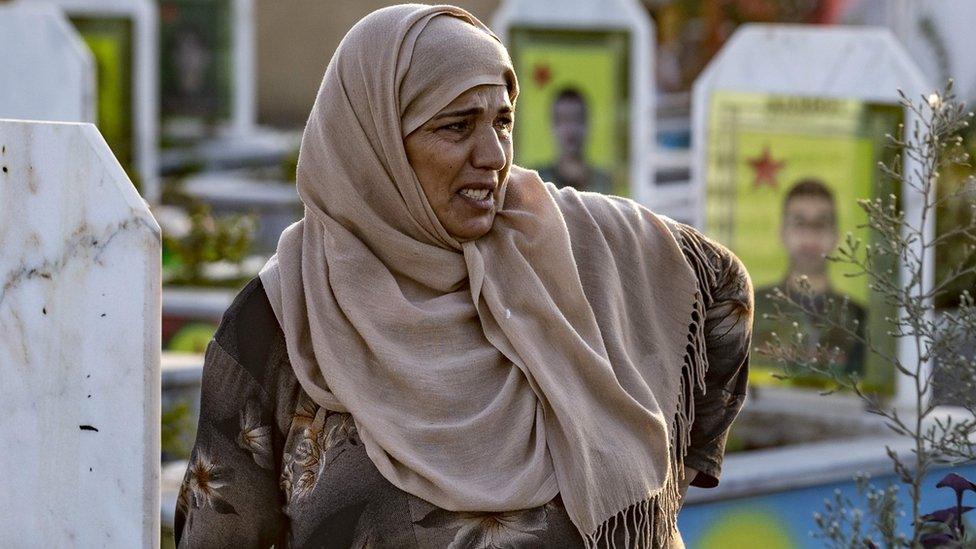
- Published15 October 2019
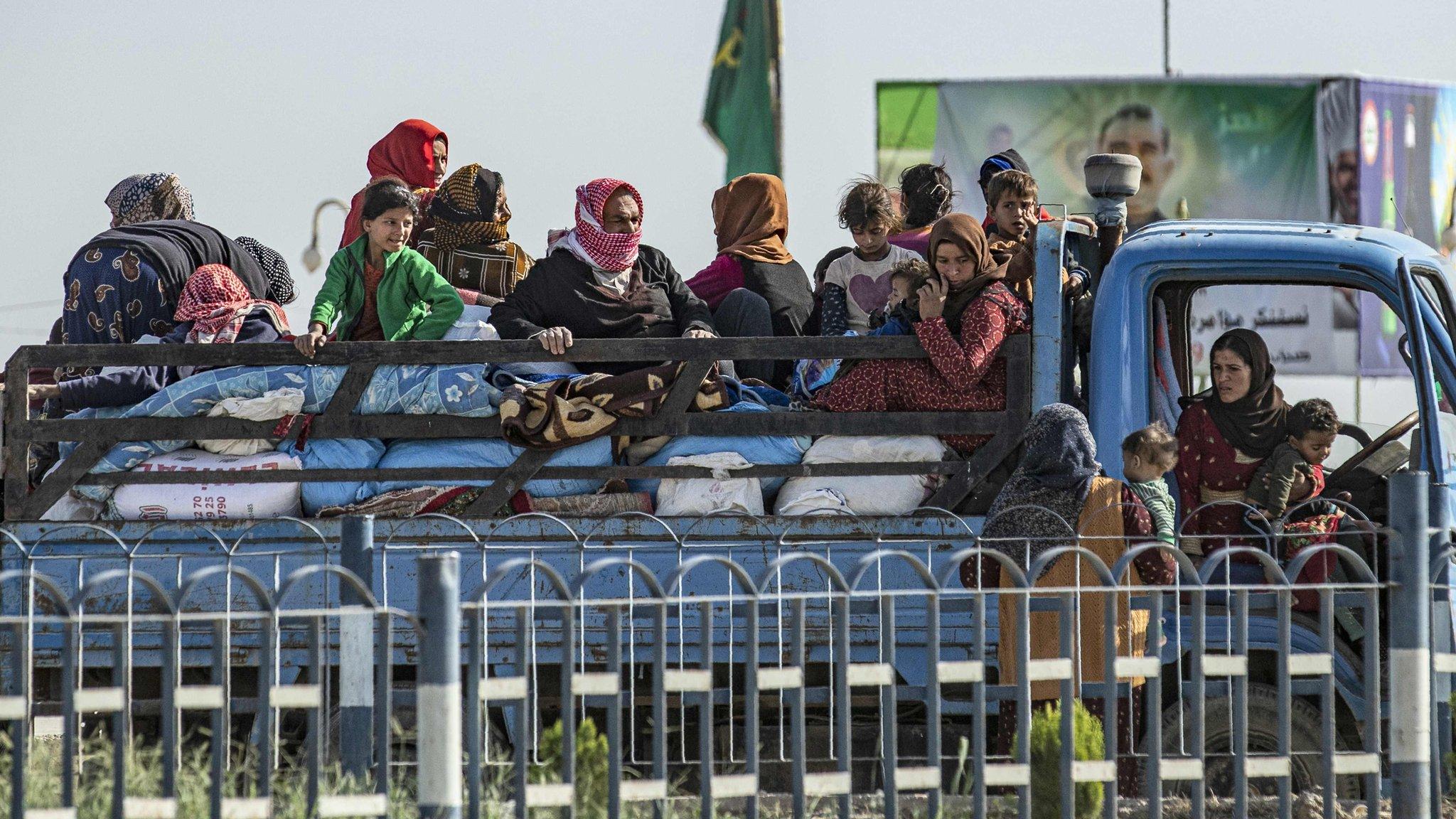
- Published14 October 2019

- Published11 October 2019
- Published10 October 2019
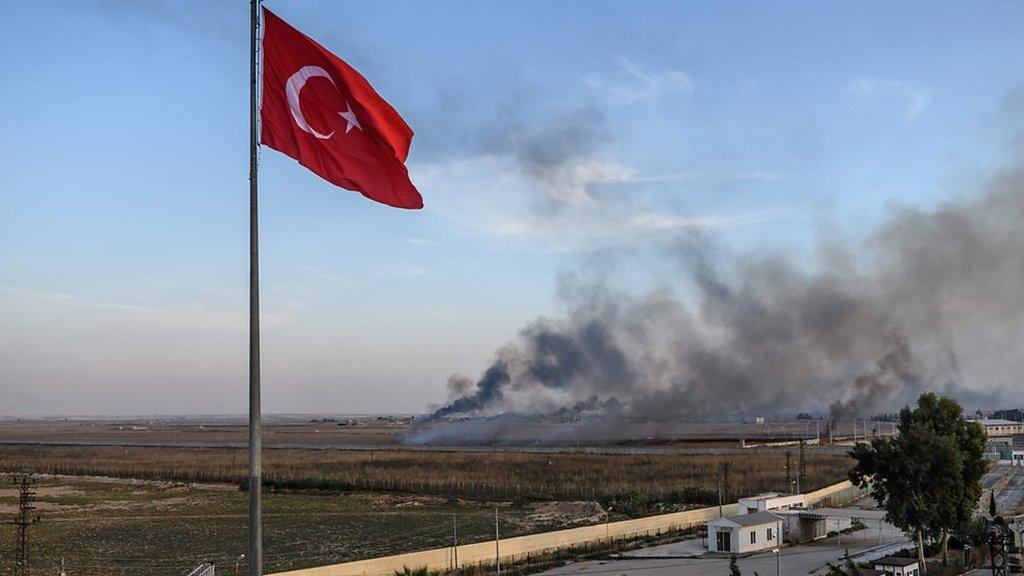
- Published14 October 2019
